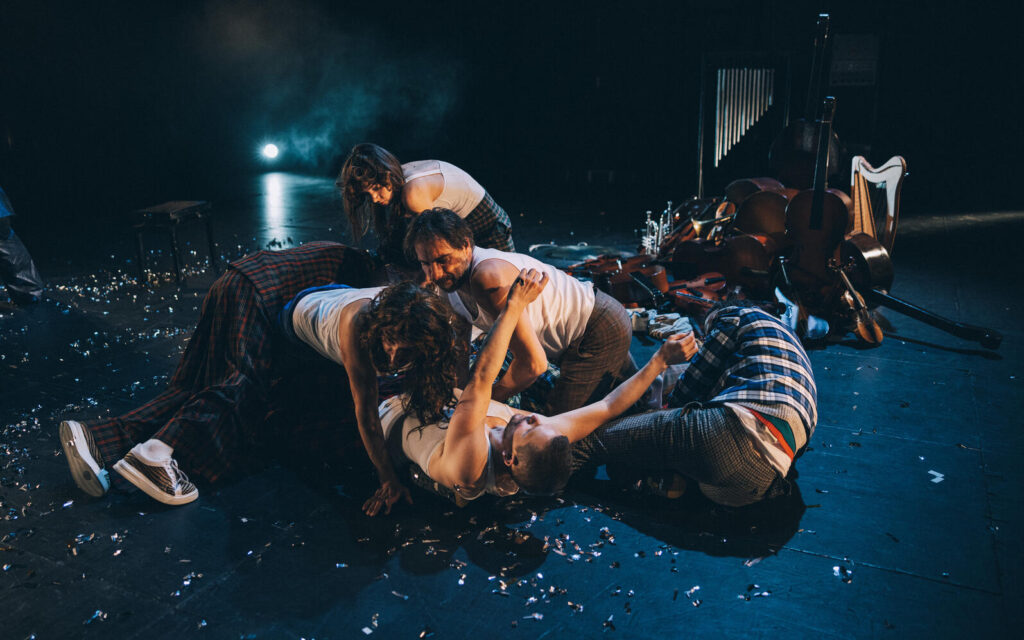SNG Maribor, Slovenia
Miloš Lolić’s production of Friedrich Dürrenmatt’s Frank V – which opened the INFANT festival in Novi Sad – is strangely captivating in its ambiguity. It is both a musical-tragicomic satire and a grotesque drama. It is like an opera minus the operatic singing and theatricality, a play with songs but without dance, a musical without the high emotions.
Thematically, therefore, Frank V is a funeral without the deceased, a family gathering without a family, and above all, a cheerful but harsh critique of capitalism without a trace of cynicism. Throughout history, the play has often been compared to Brecht’s The Threepenny Opera. Its original subtitle was Opera about a Private Bank and, in an interview with Horst Bienek in 1961, Dürrenmatt was convinced that his piece “will have to sail under the false flag of the Threepenny Opera for a long time. That is its fate.”
Dürrenmatt’s sharpened pen delves into the issue of capitalism through the example of a failed private bank. The play manages to maintain a sense of joyfulness without falling into frustration or patronizing the audience. In Frank V, the characters sing when they lie (while Brecht’s characters most often sing when they speak the truth). Gottfried Frank (Vojko Belšak) is the fifth generation at the helm of the private bank and, unlike his ancestors, is far less capable of handling the position. He “performs the sacred regal duty on behalf of the capitalist social order”. In contrast, his wife Otilija (played by Nataša Matjašec Rošker) is much more practical and proactive, handling the dirty business and not hesitating to dirty her hands (with other people’s) blood.

Frank V – SNG Maribor Photos: Peter Giodani
As the bank is not doing well financially, Frank fakes his own death and intends to liquidate the bank. He plans to live well and happily with the stolen wealth in a “climate more suitable for people”, while the bank’s debts will be taken over by the state. Two morally dubious individuals with a criminal past, Pauli and Heini, eager for quick riches, are drawn into his web of lies when offered jobs at the bank (which they had planned to rob shortly before).
They make a pact with the devil in exchange for high salaries and associated benefits. To complete the idyll, there are Frank’s children Herbert ( Blaž Dolenc) and Francisca (Julija Klavžar), who are studying abroad and to whom their parents hide their dirty business dealings. However, with the cry of “You are incompetent, now it’s our turn” in the name of capital, and to the bizarre delight of their father, the children take over the bank and kill their parents. The scene of the parents’ murder takes on a comedic tone because the mother, Otilija, refuses to give up.
Lolić has managed to find the perfect aesthetic language and style for his performance. In the beginning, the two bunglers, Pauli and Heini, receive music stands from Frank as their entry ticket into the capitalist hell. After the music stands, they soon acquire a pile of instruments that the actors bring onto the stage without perceiving their presence or treating them as props or part of the set. The instruments will be brought in and taken out twice during the performance without anyone acknowledging or playing them. The visual absurdity and comedy perfectly complement the absurdity on stage.
The Maribor ensemble are comfortable in their exaggerated and affectated performances. Nataša Matjašec Rošker, in the role of Otilija, is like Lady Macbeth in colourful trousers, and Vojko Belšak, like Richard III in a checkered jacket, hiding behind poetic quotes from Goethe, unwilling to embody the true evil that he is.
Dürrenmatt’s play was not successful in German-speaking regions but was successful in France and Eastern Bloc countries, where it was staged as a parable of capitalist evil. In Serbia, it reminded the audience of fraudulent banks active during the hyperinflation of the 1990s. It introduces a broader contemporary audience to the dehumanizing economic-political system that protects private capital at the expense of workers and has a destructive impact on society. Let that be a new flag on the ship Frank V.
Credits:
Director: Miloš Lolić // Dramaturge: Slobodan Obradović // Translator from German: Urška Brodar // Translator from Serbian: Mojca Marič // Set designer: Miloš Lolić // Costume Designer: Marija Marković Milojev // Composer: Nevena Glušica // Choreographer: Jasmin Avisar // Proofreader: Mojca Marič // Performance creator and lighting designer: Tomaž Bezjak // Repetiteur: Robert Mraček
Cast: Vojko Belšak, Nataša Matjašec Rošker, Blaž Dolenc, Julija Klavžar, Žan Koprivnik, Matevž Biber, Liza Marijina, Davor Herga, Viktor Hrvatin Meglič, Petja Labović, Gorazd Žilavec
For more information, visit: sng-mb.si
Divna Stojanov is a dramaturg and playwright. She writes mainly for children and young people.








